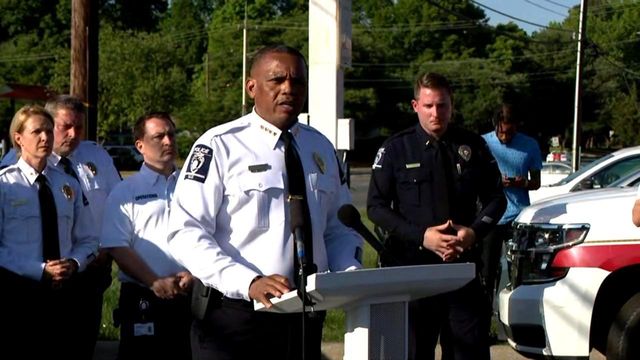In crisis: More than 10,000 dogs and cats were killed in NC animal shelters last year
Before you buy your next family pet, know this – thousands of healthy dogs and cats are killed in North Carolina each year because there is not enough room for them in local shelters.
More than 10,000 dogs and cats killed over space
Shelters in North Carolina are in crisis, especially those in rural counties.
In Robeson County, 4,085 animals were euthanized for space in 2019, according to county records, with a breakdown of 1,195 dogs and 1,890 cats. In Cumberland County, a total of 3,241 dogs and cats were euthanized in 2019. And Dani Bowen, Animal Services Director in Warren County, said at least 50 dogs and 100 cats were killed in the Warren shelter to make space for more animals in 2019.
“Adoptions here are very slow because we’re a small shelter in a rural county,” Bowen told WRAL in a phone call. “We only have 26 kennels for dogs.”
In Person County, 61 animals were euthanized for space in 2019, and in Hoke County, 423 were euthanized. Dr. Jennifer Federico, Director at the Wake County Animal Center, estimated that, in total, at least 10,000 animals are being euthanized for space each year in North Carolina shelters -- and the real number is likely much higher.
What goes wrong
Elaine Smith, Director of Cumberland County Animal Control, said pet owners surrender their animals to the shelter frequently, while other owners let their animals run loose, which increases the likelihood of them mating with other animals or getting lost and being picked up by animal control officers.
According to Smith, the Cumberland County shelter takes in more animals than almost any other North Carolina shelter – around 11,000 animals each year. It can only hold 300 animals at a time. Even with the help of fosters, volunteers and rescue groups, there is not enough space to house all stray animals.
"What people don’t understand is we literally have no choice," Smith said. "I don’t have a choice when I have 20 dogs coming in and I have no empty cages or kennels. I have to make space. If that means out of the 20, I can adopt out 10, fantastic. If I can get five to rescue, great. Maybe two go back to their owners. That still leaves me three dogs we might have to euthanize."
The decision to euthanize a dog or cat is heartbreaking for her staff, Smith said.
"People say, 'Just don't kill them,'" Smith said. "I would love that, but it's not an option for me. What we would end up doing is putting two or three animals in a kennel or putting crates in the hallways with an animal cramped in there – we’re not allowed to do that by law. Others say, 'Just turn them loose.' But we can’t just turn an animal loose to suffer a fate – it could starve to death or get hit by a car. So the only thing we can do that is at least painless for the animal is euthanasia."
Adopting vs. buying animals
Animal lovers may be stunned to hear that thousands of healthy dogs and cats are killed in shelters each year while many people pay pet stores and breeders more than $2,000 for an animal.
Federico said most people go with a breeder because they want a specific breed -- but many rescues offer those breeds or similar mixed breeds, which may be healthier than purebreds.
WRAL's Pet of the Day coverage
"There’s a lot of genetic diseases that are prevalent in pure breed dogs," she said. "So if you mix them, you decrease their chances of having those diseases."
"The difference is 'this pet is here and already needs a home,' versus 'I'm going to wait for that dog to be bred,'" Federico added.
The pros of adopting
Breeders sell dogs for thousands of dollars, but animal shelters and rescues offer adoption fees at a fraction of that cost, ranging anywhere from $25 to $300. Many shelters and rescues include the cost of spay and neuter surgery in that price or deliver a refund once a new owner has proved their animal had the surgery.
Many shelter pets have already been seen by a veterinarian and vaccinated. Adult dogs are often potty-trained and ready to go home with a loving family.
"If you’re not set on a breed, there’s no difference in getting a shelter pet," Federico. "If you want a small breed dog, we have some pretty freaking cute small breed dogs that come through here. And here, you know they are going to be vaccinated, spayed and neutered, microchipped and have their rabies vaccine."
'It's the worst possible thing'
The truth is hard to hear, and it's even harder for the animal-loving staff who work in county shelters. Federico and Smith both said their homes, and their coworkers homes, are full of animals no one else would adopt.
"It’s horrible," Smith said. "I hate it because it’s just the worst possible thing. We work here at an animal shelter because we love animals. We wouldn’t do this job if we didn’t. So it’s very hard to essentially kill something you love. "
Smith said anyone who works at an animal shelter has at some point been harassed or criticized by uninformed people.
"Anyone who works at an animal shelter has at some point been called a murderer," Smith said. "If people are upset by this, I understand that. It’s upsetting, it’s not something you want to hear. But if we cover it up or conceal it in some kind of way, or try to sugarcoat it, then that’s not helping those animals."
Adopt, don't shop
It's simple -- when you adopt a dog or cat from a shelter, you clear a cage for another homeless animal.
You can even save the lives of small animals like rabbits and guinea pigs by adopting them from shelters instead of buying them from retail stores.
Finally, if you choose to buy from a breeder, investigate them thoroughly. Federico and Smith want people to know that there are responsible breeders who only yield one or two litters a year. A good breeder ensures dogs receive adequate medical care and love and involves the buyer in the adoption process. If a breeder refuses to show you the puppy's parents, it's a bad sign, Federico said.
How to help
Anyone can choose to adopt from a rescue or shelter when possible.
Pet owners can spay and neuter their pets and keep them leashed or in fences while outdoors. Surrendering a pet should be a last resort. Before taking a pet to a shelter, reach out to friends, family and acquaintances to see if anyone can help.
Pet lovers can contact their county shelter or local rescue groups to foster animals or volunteer. Many shelters just need someone to spend time with animals so they can experience human interaction.
Share photos and videos of your rescue pets on social media, or tell people about them by word-of-mouth. There are so many stereotypes about shelter dogs that are just not true.
Donate time, money or resources, like towels, pet beds, food, flea and tick medications, shampoo, newspapers and more. Contact your local shelter to determine its specific needs.













